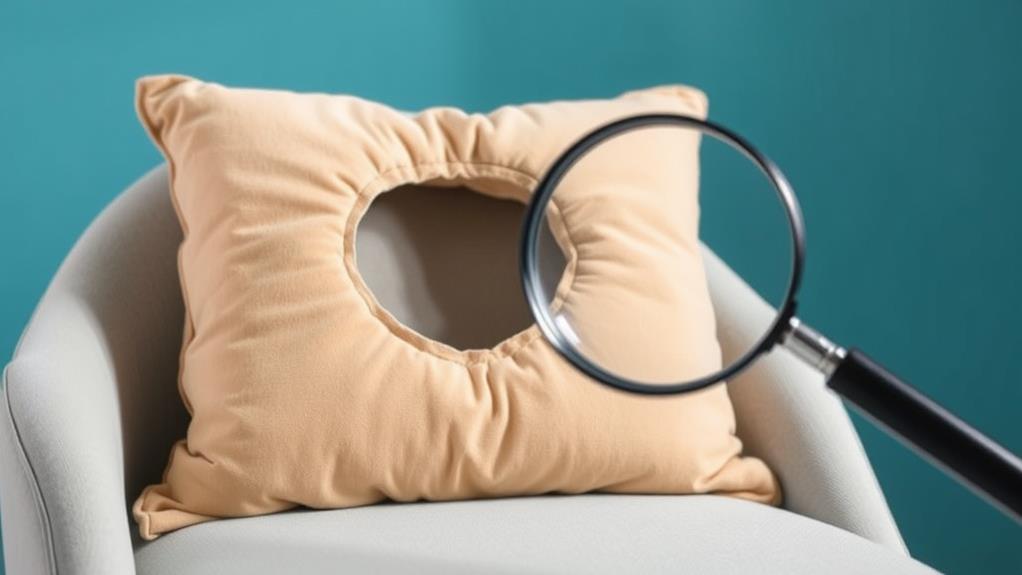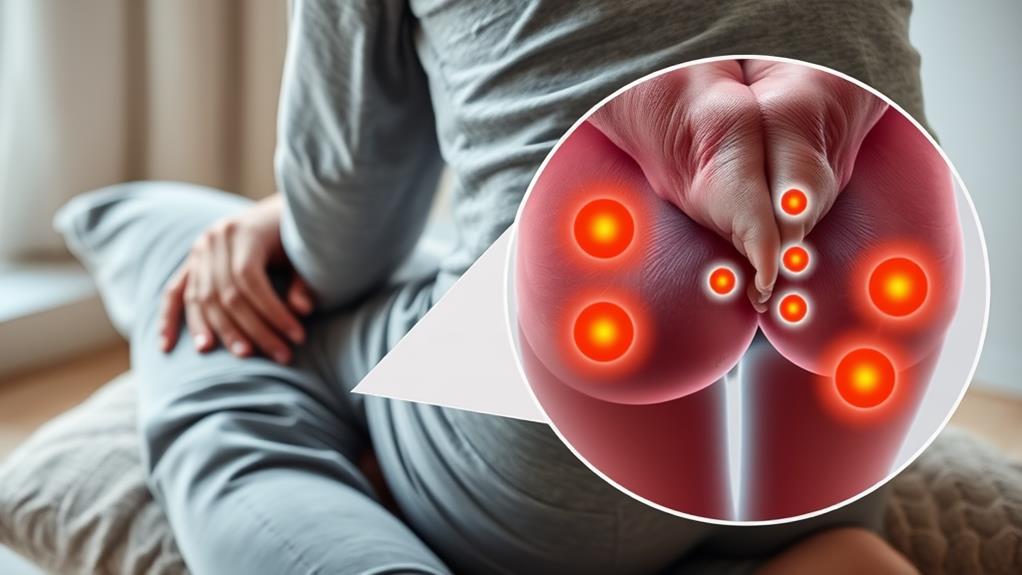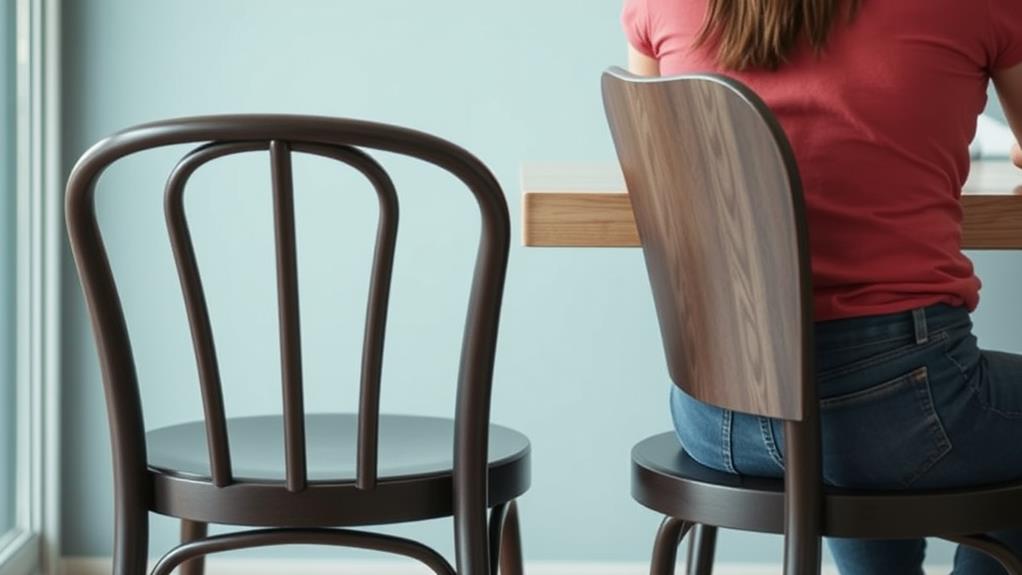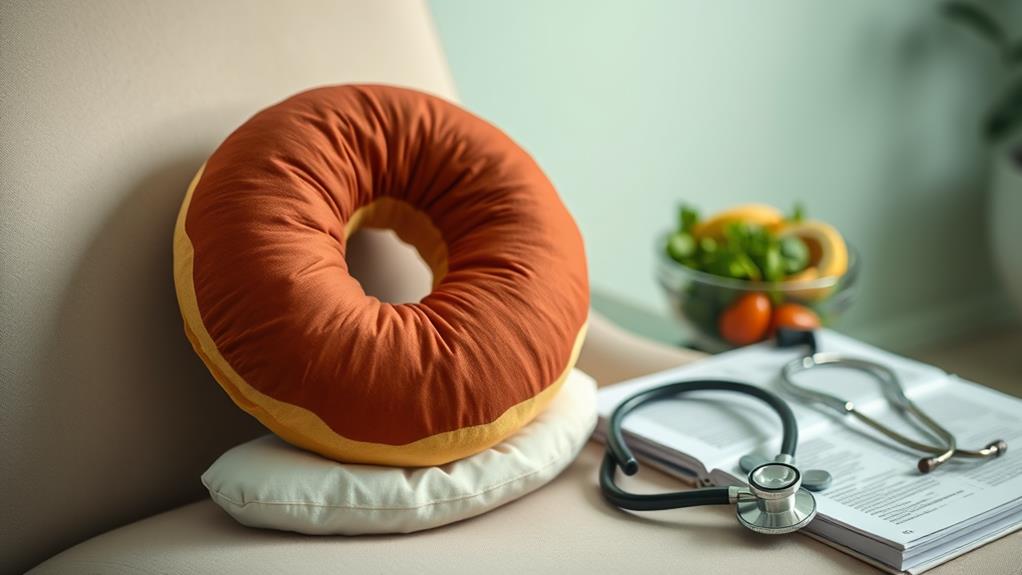As an Amazon Associate I earn from qualifying purchases.
Contrary to popular belief, hemorrhoids aren't caused by poor hygiene or diet alone. They result from increased pressure in the lower rectum, often due to lifestyle factors. You can develop hemorrhoids at any age, and they're not always painful. While external hemorrhoids can be uncomfortable, internal ones are often painless. Hemorrhoids aren't contagious and can't be spread through contact. Treatment doesn't always require surgery; many cases can be managed with lifestyle changes and over-the-counter remedies. By understanding these facts, you'll be better equipped to prevent and manage hemorrhoids effectively. There's more to uncover about this common condition.
Common Hemorrhoid Misconceptions

Let's debunk some widespread myths about hemorrhoids. When it comes to this common condition, there's a lot of misinformation out there. Separating fact from fiction is vital for understanding and managing hemorrhoids effectively.
One of the biggest hemorrhoid myths is that they're caused solely by poor hygiene. While cleanliness is important, it's not the primary factor. The truth is, hemorrhoids are often the result of increased pressure in the lower rectum, which can be caused by various lifestyle factors. Contrary to popular belief, spicy foods don't cause hemorrhoids, though they may irritate existing ones.
Another common misconception is that sitting on cold surfaces leads to hemorrhoids. This isn't true, but prolonged sitting can contribute to their development. Many people believe hemorrhoids always require surgery, but that's far from reality. There are numerous non-invasive treatment options available, including lifestyle changes and over-the-counter remedies.
Age and Hemorrhoid Development
Moving from general misconceptions, it's important to address a specific myth about age and hemorrhoids. Contrary to popular belief, hemorrhoids don't exclusively affect older people. You can develop this condition at any age, including childhood and young adulthood.
While it's true that your risk of hemorrhoids may increase as you age due to weakened rectal tissues, age isn't the sole determining factor. Lifestyle choices play a significant role in hemorrhoid development, regardless of your age. Poor diet, lack of exercise, and prolonged sitting can contribute to this common condition.
Here's a breakdown of age-related hemorrhoid facts:
| Age Group | Risk Factors | Prevention |
|---|---|---|
| Children | Constipation | Fiber-rich diet |
| Young Adults | Sedentary lifestyle | Regular exercise |
| Middle-aged | Pregnancy, obesity | Weight management |
| Older Adults | Weakened rectal veins | Hydration |
| All Ages | Straining during bowel movements | Proper toilet habits |
Pain Levels in Hemorrhoids

You might be surprised to learn that hemorrhoids don't always cause pain. The discomfort levels can range from barely noticeable to severely uncomfortable, depending on various factors. Your hemorrhoid's location, size, and whether it's internal or external can substantially influence the pain severity you experience.
Varying Discomfort Levels
Hemorrhoids can cause a wide range of discomfort, from mild irritation to severe pain. Contrary to the myth that "Hemorrhoids Are Always" painful, you might experience varying discomfort levels depending on the type and severity of your condition. Some people may have hemorrhoids with no noticeable symptoms, while others might suffer from intense itching and discomfort.
External hemorrhoids often cause more discomfort than internal ones, as they're located in an area with more nerve endings. You might feel burning, itching, or sharp pain, especially during bowel movements. However, not all hemorrhoids are always painful. Some may only cause mild irritation or a feeling of fullness in the rectum.
The veins in the rectum can become swollen and inflamed without causing significant pain. In these cases, you might only notice slight discomfort or pressure. To manage symptoms, you can try over-the-counter hemorrhoid creams for temporary relief. Remember that discomfort levels can fluctuate, so what feels bearable one day might be more intense the next. If you're experiencing persistent or severe pain, consult your doctor for proper treatment.
Pain Severity Factors
In spite of the myth that all hemorrhoids are equally painful, several factors contribute to the severity of discomfort you might experience. The location and type of hemorrhoids play a significant role in pain levels. External hemorrhoids tend to be more painful, especially if they become thrombosed, while internal hemorrhoids may not cause noticeable symptoms until they enlarge or prolapse.
Your lifestyle habits can greatly impact pain severity. Straining during bowel movements, chronic constipation or diarrhea, and sitting for long periods can exacerbate discomfort. Additionally, lack of physical activity and poor dietary choices may contribute to hemorrhoid development and increased pain.
It's important to note that hemorrhoids can cause varying levels of discomfort, from mild irritation to severe pain. As they become more common with age, seeking medical advice is vital if you experience persistent or worsening symptoms. Your doctor can recommend appropriate treatments and lifestyle changes to alleviate pain and prevent complications.
Hygiene and Hemorrhoid Formation
You might have heard that poor hygiene causes hemorrhoids, but this is largely a myth. While cleanliness is important for overall health, it doesn't directly influence hemorrhoid formation. Your hygiene habits, such as wiping techniques or frequency of bathing, have minimal impact on your risk of developing hemorrhoids.
Cleanliness and Hemorrhoid Risk
Many people believe that poor hygiene directly causes hemorrhoids, but this is a common misconception. While cleanliness is vital for your overall health and well-being, it's not the primary factor in hemorrhoid formation. Let's debunk some myths surrounding this topic.
One of the most prevalent myths is that you can catch hemorrhoids from someone else. This simply isn't true. Hemorrhoids are swollen blood vessels in the rectal and anal area, not an infectious disease. You cannot catch hemorrhoids from sitting on a toilet seat or sharing personal items with someone who has them.
However, proper hygiene is still important. Keeping the skin around the anus clean can help prevent irritation and infection, which may worsen existing hemorrhoids or cause discomfort. Regular washing with mild soap and warm water is sufficient. Avoid using harsh soaps or excessive wiping, as these can irritate the sensitive skin in this area.
Hygiene Habits' Actual Impact
While hygiene doesn't directly cause hemorrhoids, certain habits can indeed impact their formation and severity. It's important to set the record straight on common myths surrounding this condition that affects people of all ages. Your hygiene habits play a role in managing hemorrhoids, but they're not the sole cause.
Excessive wiping or using harsh soaps can irritate the anal area, potentially worsening existing hemorrhoids. On the flip side, maintaining good hygiene can help prevent complications. Gentle cleaning with mild soap and warm water is usually sufficient. Avoid using scented wipes or toilet paper, as these may cause further irritation.
In most cases, hemorrhoids can be managed through conservative methods and lifestyle modifications. These include increasing fiber intake, staying hydrated, and avoiding prolonged sitting on the toilet. If you're experiencing persistent symptoms, don't hesitate to seek medical advice. Many cases respond well to minimally invasive treatments, and your doctor can recommend the best course of action based on your specific situation. Remember, proper hygiene is just one aspect of managing this common condition.
Contagiousness of Hemorrhoids

Let's debunk a common misconception: hemorrhoids aren't contagious. This common ailment, which affects millions of people worldwide, can't be transmitted from person to person. Hemorrhoids develop when veins in the rectal area become swollen and inflamed, often due to increased pressure. They're a temporary condition in most cases and can affect people of all ages.
Understanding the facts surrounding hemorrhoids is vital for dispelling myths and ensuring proper care.
- Internal hemorrhoids occur inside the rectum and are usually painless
- External hemorrhoids form under the skin around the anus and can be painful
- Both types can be managed with non-surgical methods in most cases
Myths Debunked: Separating Fact From Fiction is essential for proper treatment and prevention. While hygiene habits play a role in managing symptoms, they don't cause or spread hemorrhoids. The condition isn't infectious, so you can't "catch" it from someone else or spread it to others. Remember, if you're experiencing persistent discomfort or bleeding, it's important to consult a healthcare professional for proper diagnosis and treatment.
Treatment Options for Hemorrhoids
Several effective treatment options are available for managing hemorrhoids. You'll find that many cases can be resolved through lifestyle modifications and over-the-counter treatments. Sitz baths and ice packs can provide relief from pain and discomfort, while increasing your fiber intake and making dietary changes can promote regular bowel movements and reduce straining.
To prevent hemorrhoids, it's vital to maintain a healthy lifestyle. Regular exercise and proper breathing techniques during weight lifting can minimize anal pressure. Avoid prolonged sitting and practice good bathroom habits to reduce your risk.
Over-the-counter treatments like creams and ointments can help alleviate symptoms and promote healing. If these methods don't provide sufficient relief, your doctor may recommend more advanced options. For severe cases that don't respond to conservative treatments, minimally invasive surgery might be necessary.
Frequently Asked Questions
What Is an Interesting Fact About Hemorrhoids?
Did you know hemorrhoids have a forgotten history dating back to ancient times? You'll find their origins mysterious, with hidden causes and painful symptoms. They're a common affliction, but many are silent sufferers. Unusual remedies have been used throughout history.
What Is the Lifespan of a Hemorrhoid?
Your hemorrhoid's lifespan varies. Without treatment, you'll face prolonged suffering and painful episodes. With proper symptom management and treatment, you can reduce inflammation, improve blood flow, and lower rectal pressure. Hemorrhoid stages and recurrence risk affect duration.
Is It Embarrassing to Say You Have Hemorrhoids?
Like a weight lifted, revealing your hemorrhoids can be freeing. You shouldn't feel personal shame or bear the emotional burden alone. Despite being a sensitive topic, it's not a humiliating experience. Don't let social stigma turn it into secret suffering.
Are Hemorrhoids Linked to Anything?
Yes, hemorrhoids are linked to various factors. You might have a genetic predisposition or family history. Poor diet, lack of exercise, prolonged sitting, and obesity can increase your risk. Pregnancy, hormonal changes, and increased pressure can weaken veins, causing complications.
Conclusion
You've now learned the truth behind common hemorrhoid myths. Armed with facts, you're better equipped to prevent, identify, and treat this condition. Remember, hemorrhoids affect about 1 in 20 Americans, so you're not alone. Don't let embarrassment or misinformation keep you from seeking help. With proper care and treatment, you can find relief and improve your quality of life. Stay informed and take charge of your health.
Amazon and the Amazon logo are trademarks of Amazon.com, Inc, or its affiliates.
